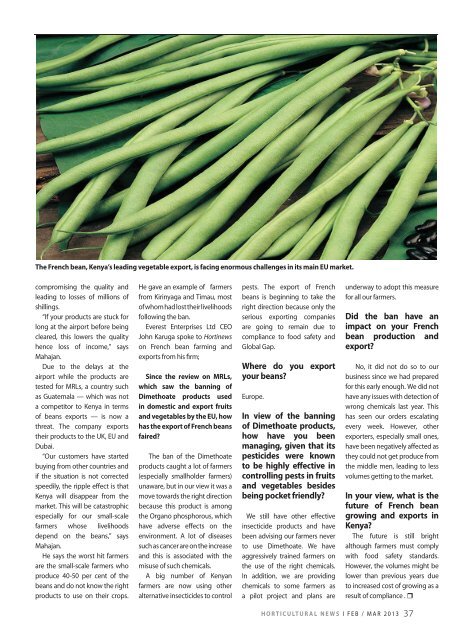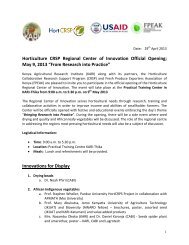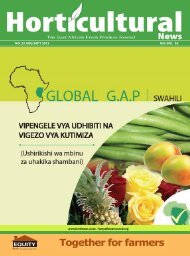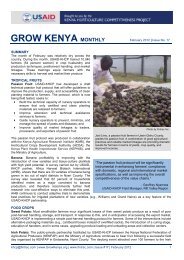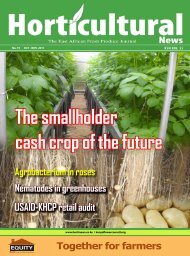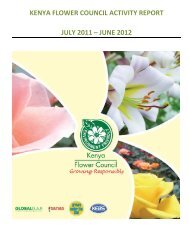FEB-MARCH 2013 ISSUE Final.ai - Hortinews.co.ke
FEB-MARCH 2013 ISSUE Final.ai - Hortinews.co.ke
FEB-MARCH 2013 ISSUE Final.ai - Hortinews.co.ke
Create successful ePaper yourself
Turn your PDF publications into a flip-book with our unique Google optimized e-Paper software.
The French bean, Kenya’s leading vegetable export, is facing enormous challenges in its m<strong>ai</strong>n EU mar<strong>ke</strong>t.<br />
<strong>co</strong>mpromising the quality and<br />
leading to losses of millions of<br />
shillings.<br />
“If your products are stuck for<br />
long at the <strong>ai</strong>rport before being<br />
cleared, this lowers the quality<br />
hence loss of in<strong>co</strong>me,” says<br />
Mahajan.<br />
Due to the delays at the<br />
<strong>ai</strong>rport while the products are<br />
tested for MRLs, a <strong>co</strong>untry such<br />
as Guatemala — which was not<br />
a <strong>co</strong>mpetitor to Kenya in terms<br />
of beans exports — is now a<br />
threat. The <strong>co</strong>mpany exports<br />
their products to the UK, EU and<br />
Dub<strong>ai</strong>.<br />
“Our customers have started<br />
buying from other <strong>co</strong>untries and<br />
if the situation is not <strong>co</strong>rrected<br />
speedily, the ripple effect is that<br />
Kenya will disappear from the<br />
mar<strong>ke</strong>t. This will be catastrophic<br />
especially for our small-scale<br />
farmers whose livelihoods<br />
depend on the beans,” says<br />
Mahajan.<br />
He says the worst hit farmers<br />
are the small-scale farmers who<br />
produce 40-50 per cent of the<br />
beans and do not know the right<br />
products to use on their crops.<br />
He gave an example of farmers<br />
from Kirinyaga and Timau, most<br />
of whom had lost their livelihoods<br />
following the ban.<br />
Everest Enterprises Ltd CEO<br />
John Karuga spo<strong>ke</strong> to <strong>Hortinews</strong><br />
on French bean farming and<br />
exports from his firm;<br />
Since the review on MRLs,<br />
which saw the banning of<br />
Dimethoate products used<br />
in domestic and export fruits<br />
and vegetables by the EU, how<br />
has the export of French beans<br />
f<strong>ai</strong>red<br />
The ban of the Dimethoate<br />
products caught a lot of farmers<br />
(especially smallholder farmers)<br />
unaware, but in our view it was a<br />
move towards the right direction<br />
because this product is among<br />
the Organo phosphorous, which<br />
have adverse effects on the<br />
environment. A lot of diseases<br />
such as cancer are on the increase<br />
and this is associated with the<br />
misuse of such chemicals.<br />
A big number of Kenyan<br />
farmers are now using other<br />
alternative insecticides to <strong>co</strong>ntrol<br />
pests. The export of French<br />
beans is beginning to ta<strong>ke</strong> the<br />
right direction because only the<br />
serious exporting <strong>co</strong>mpanies<br />
are going to rem<strong>ai</strong>n due to<br />
<strong>co</strong>mpliance to food safety and<br />
Global Gap.<br />
Where do you export<br />
your beans<br />
Europe.<br />
In view of the banning<br />
of Dimethoate products,<br />
how have you been<br />
managing, given that its<br />
pesticides were known<br />
to be highly effective in<br />
<strong>co</strong>ntrolling pests in fruits<br />
and vegetables besides<br />
being poc<strong>ke</strong>t friendly<br />
We still have other effective<br />
insecticide products and have<br />
been advising our farmers never<br />
to use Dimethoate. We have<br />
aggressively tr<strong>ai</strong>ned farmers on<br />
the use of the right chemicals.<br />
In addition, we are providing<br />
chemicals to some farmers as<br />
a pilot project and plans are<br />
underway to adopt this measure<br />
for all our farmers.<br />
Did the ban have an<br />
impact on your French<br />
bean production and<br />
export<br />
No, it did not do so to our<br />
business since we had prepared<br />
for this early enough. We did not<br />
have any issues with detection of<br />
wrong chemicals last year. This<br />
has seen our orders escalating<br />
every week. However, other<br />
exporters, especially small ones,<br />
have been negatively affected as<br />
they <strong>co</strong>uld not get produce from<br />
the middle men, leading to less<br />
volumes getting to the mar<strong>ke</strong>t.<br />
In your view, what is the<br />
future of French bean<br />
growing and exports in<br />
Kenya<br />
The future is still bright<br />
although farmers must <strong>co</strong>mply<br />
with food safety standards.<br />
However, the volumes might be<br />
lower than previous years due<br />
to increased <strong>co</strong>st of growing as a<br />
result of <strong>co</strong>mpliance . <br />
HORTICULTURAL NEWS I <strong>FEB</strong> / MAR <strong>2013</strong> 37


